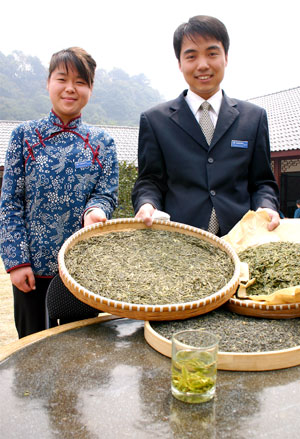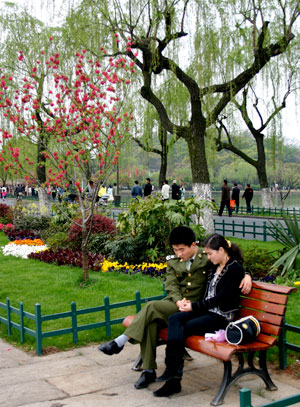HANGZHOU, CHINA - The neatly attired young man welcomed us to his tiny tea village that rests just outside this mega-city of six million people by saying: “I will be your guide because I am the only one here who speaks English.”
Then he quickly disappeared into a small white stucco building, telling us as he departed: “I will be back in one minute.” In his absence, we watched in amazement as an elderly man scooped up some green tea leaves and swirled them around in a large heated iron wok.
“Oh, I see you are intrigued by the way the tea leaves are dried,” said the man known as Mr. Plum as he reappeared holding three large bundles wrapped in brown paper.
“This is the finished product,” said the jovial guide as he untied the parcels and laid the precious dried tea before us. When an assistant arrived with some hot water Mr. Plum donned a pair of white gloves – they prevent moisture from the hand seeping into the dry leaves - pinched some loose tea leaves between his fingers and dropped them into a clear glass. He then poured hot water into the glass but stopped halfway, filling us in on some tea etiquette as he swished the contents around.
“The Chinese custom is to welcome a visitor with just a half glass of tea and then only after swirling the glass around do we fill it,” said Mr. Plum, who was born in this town which, when translated means Plum Family Tea Village (no relation to our Mr. Plum) where they’ve been growing and serving tea for over 1,200 years. They take tea seriously here - right down to the temperature of the water it’s steeped in.
“Never use boiling water – the water need only be hot. Otherwise, you will ruin the taste of the tea,” said Mr. Plum, who went on to say this region of China is famous for its Dragon Well tea, the top form of green tea.


Left: Mr Plum and his assistant show off their valuable tea. Right: Local couple share a romantic moment.
There are three types of tea in the world - green, black and oolong. Green tea is the national tea of China and Hangzhou’s Dragon Well variety is the most expensive type – a half kilo goes for $500. It was, after all, the preferred brand of China’s emperors throughout history. And, a half kilo will make 400 cups.
As we sipped the delicious contents of our glass and listened to Mr. Plum’s tea explanations, a group of women paraded past the village compound wearing cone-shaped straw hats with bags slung over their shoulders.
The women, Mr. Plum would later tell us, have the back breaking choir of picking the leaves in terraced fields while the men get to dry it.
The hills and fields surrounding the village are lush with tea bushes, which look more like a hedge. In all, over 1,200 hectares here are dedicated to tea growing. Some of the bushes are 400 years old but Mr. Plum told us five-year-old bushes actually yield the best quality tea.
The Chinese put a lot of stock in tea’s medicinal benefits, and for good reason. According to our guide, “a cup of tea a day keeps the doctor away.” And he supplied us with proof. “Tests at America’s Columbia University showed that green tea helps cancer victims prolong their lives – up to three years in some cases - and helps people lose weight. The study also suggested computer users should drink green tea because it rids the body of anti-oxidants and unwanted rays. “Adding tangerine peel to green tea helps diabetics,” said Mr. Plum who provided us a recipe – “add five pounds of tangerine peel to 10 pounds of green tea.”
We didn’t need any more convincing.
“We’ll take some home,” we told Mr. Plum.
“You are very lucky today. I am the village’s best packer and my packing method means more tea for you,” said Mr. Plum as he scooped the dried leaves into a small canister until it was overflowing and then quickly closed the lid.
Mr. Plum’s village is just one of China’s many fascinating places that fit travelers to a “tea.”
Information
- Hangzhou is a one-hour drive from Shanghai. The tea village is just outside the city.
- Hangzhou is famous for its silk factories and markets and its legendary West Lake.
- The first – and best – tea crop is in March and the second is in April.
- The best tea is never used in bags.
- High quality tea has a sweet taste.
- Hnagzhou’s Dragon Well tea is never exported – 70 per cent is reserved for China’s high-ranking government officials and the rest is bought by the country’s wealthy.
About the Author
Marc Atchison is a veteran journalist and a seasoned traveller with more than 20 years of travel writing experience. As the former Travel Editor of the Toronto Star, Canada's largest newspaper, and now Editor-in-Chief and Senior Writer for TraveLife magazine (Canada) and travelife.ca, Marc has been to over 100 countries in the world. Japan is one of his favorite destinations and he's been there on numerous occasions.